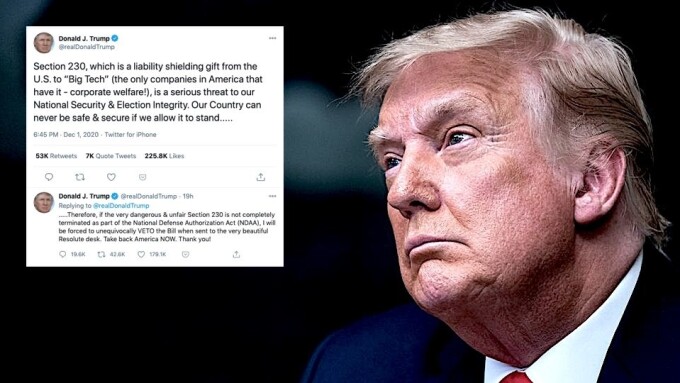WASHINGTON — In the latest in a series of procedurally unprecedented presidential attempts to repeal the so-called First Amendment of the internet, Donald Trump confirmed last night via Twitter that he would veto the nation’s principal defense bill unless Congress adds a section “completely terminating” Section 230 protections.
At 6:45 p.m. last night, Trump issued his warning via two tweets:
“Section 230, which is a liability shielding gift from the U.S. to ‘Big Tech’ (the only companies in America that have it - corporate welfare!), is a serious threat to our National Security & Election Integrity. Our Country can never be safe & secure if we allow it to stand…..”
“…..Therefore, if the very dangerous & unfair Section 230 is not completely terminated as part of the National Defense Authorization Act (NDAA), I will be forced to unequivocally VETO the Bill when sent to the very beautiful Resolute desk. Take back America NOW. Thank you!”
The move had been anticipated anonymously earlier this week by sources close to congressional Republicans, who had leaked the information through the news site Axios.
Online free speech advocates had also been sounding the alarm to press and activists that the White House was pressuring GOP congress members to insert Section 230-repealing language into the crucial NDAA package.
The NDAA provides for the operational continuity of the U.S. military and it has been traditionally passed every year by consensus for almost six decades.
Tampering With a 'Must-Pass' Bill
Axios had reported yesterday that “the Trump administration is pressing Congress to repeal the tech industry's prized liability shield, Section 230 […], as part of a must-pass end-of-year defense-spending authorization bill, sources tell Axios, while Senate Republicans try to improvise a more limited change.”
The site quoted “a source familiar with the negotiations” and pointed out that Sen. Roger Wicker, the Republican chairman of the Senate Commerce Committee, had counter-proposed that his bill limiting Section 230 protections — one of several being considered by Congress — be included in the National Defense Authorization Act.
Trump’s tweets from last night confirm reporting by Axios that he advocated for “lawmakers to insert a repeal of Section 230 into the NDAA, as part of a compromise that would have President Trump sign the bill even though he's opposed to a provision that renames military bases that are named for Confederate leaders.”
The unusual, last-minute insertion of the Section 230 debate — which XBIZ has been covering extensively since earlier this year, when both Trump and presumptive President-elect Joe Biden advocated for its repeal — into the defense bill prompted journalist Matthew Yglesias to jokingly tweet, “Compromise: Keep Section 230 but name it after a Confederate general.”
'A Classless Move'
"The PACT ACT, and other similar legislation aimed at Section 230 leave the internet worse off,” Section 230 expert James Czerniawski, Tech and Innovation Policy Analyst at Utah’s free-market think tank Libertas Institute, told XBIZ.
“Similar to SESTA/FOSTA, these proposed reforms will likely have a significant impact on the availability of content and information online. No doubt, it will especially impact adult content on the mainstream web," he continued.
Czerniawski called the strategy "a classless move by members of Congress to attempt to force Section 230 reform through unrelated legislation for military spending."








